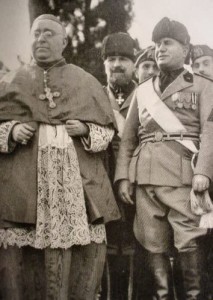 Just a week or so after the latest Papal attack on the iniquities of greed, international finance and all the rest of it, the Guardian obliges with an entertaining piece of history:
Just a week or so after the latest Papal attack on the iniquities of greed, international finance and all the rest of it, the Guardian obliges with an entertaining piece of history:
Behind a disguised offshore company structure, the church’s international portfolio has been built up over the years, using cash originally handed over by Mussolini in return for papal recognition of the Italian fascist regime in 1929.
Since then the international value of Mussolini’s nest-egg has mounted until it now exceeds £500m. In 2006, at the height of the recent property bubble, the Vatican spent £15m of those funds to buy 30 St James’s Square. Other UK properties are at 168 New Bond Street and in the city of Coventry. It also owns blocks of flats in Paris and Switzerland.
The surprising aspect for some will be the lengths to which the Vatican has gone to preserve secrecy about the Mussolini millions. The St James’s Square office block was bought by a company called British Grolux Investments Ltd, which also holds the other UK properties. Published registers at Companies House do not disclose the company’s true ownership, nor make any mention of the Vatican….
While secrecy about the Fascist origins of the papacy’s wealth might have been understandable in wartime, what is less clear is why the Vatican subsequently continued to maintain secrecy about its holdings in Britain, even after its financial structure was reorganised in 1999.
The Guardian asked the Vatican’s representative in London, the papal nuncio, archbishop Antonio Mennini, why the papacy continued with such secrecy over the identity of its property investments in London. We also asked what the pope spent the income on. True to its tradition of silence on the subject, the Roman Catholic church’s spokesman said that the nuncio had no comment.
Not necessarily the most shocking story in the world, but it comes with enough ironies to make it worth repeating, not least this (also from the Guardian, back in 2008):
It is a message sent from on high to the world’s financial and political elite. The Roman Catholic Church is calling for the effective closure of secretive tax havens as a ‘necessary first step’ to restore the global economy to health.
In a policy paper from the Holy See, Pope Benedict pins the blame for the international financial crisis largely on ‘offshore centres’, many of which, such as the Channel Islands, are British dependencies.
‘They have given support to imprudent economic and financial practices and have also played a significant role in the imbalances of development, allowing a gigantic flight of capital linked to tax evasion,’ says the report. ‘Offshore markets could also be linked to the recycling of profits from illegal activities.’
And they have proved pretty handy for the Vatican too.
Not, of course, that Benedict knew that. He had no idea. None at all.

Such high hopes after discovering secular right, only to find you’re just another anti-Catholic whacko. Sigh.
I disagree with many of the teachings of the Roman Catholic Church, but I’m no anti-Catholic. Whether I’m a “whacko” is not for me to say! Combining a report on the Roman Catholic Church’s use (in this instance) of offshore financial centers with a comment about the Pope’s condemnation of such centers seemed to me to be entirely reasonable.
“anti-Catholic whacko”? Hmmm, well, that IS truly a substantive rebuttal, now isn’t it?
Anyhow, this story presents us with a good segue to a discussion about the character and mentality of the first pope. It stands to reason that Peter’s character and mentality continues to influence the papacy as it is today, so we might learn something important about the RCC by developing an accurate profile of the first vicar of Christ. Not even the Vatican should object to this.
Now, Vatican sources allege that Pope Peter was with Ananias and Sapphira at the time of their mysterious deaths. Sources close to the Pope Benedict himself contend that Ananias and Sapphira had it coming and that it was a god’s will. Nevertheless, there is scant evidence of divine intervention at the time of their deaths, and the homicides occured under conditions which suggest that additional investigation is warranted.
See Acts of the Apostles 5:1-11 for additional details.
You may not be, Andrew, but Bradlaugh is anti-Catholic
Frankly I am too, and not really embarrassed at all about it.